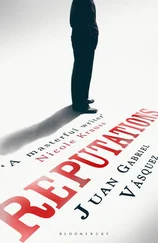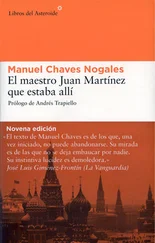When she went into the living room to warm up a little, thinking the cold must not be good for the little girl in her belly, she was surprised to find a stranger sitting in the yellow easy chair, not wearing rubber boots, or hunting gear, or a beater’s orange fluorescent jacket, but a wool sweater the collar of which seemed to be folded four times and gave the man the look of a storybook sailor, but a strange sailor, a sailor without a sailor’s beard, fond of Alfred Brendel’s piano playing and owner of an expression of cynicism or indifferent aversion that had to have been cultivated on dry land. He looked up when he saw her, the woman of the house, come in, and in a display of rudeness that seemed improbable limited his greeting to a nod of the head, not as a sign of welcome, but as if congratulating himself for doing so well what he was doing with his busy hands. And what was that, what were his hands busy with? Selma took a little while to realize that the trail of white linen the man was manipulating was in fact a deck of cards, moving with such speed and such skill, passed from one hand to the other with such dexterity, that from afar and in the gloom of the living room (it was early and no fire had been lit yet) what Selma’s eyes managed to see was just a colorless rainbow, and then, when she asked the man to do it more slowly, a succession of pink or gray squares, a blend of white background, and the alternating tones of the figures. It was eight-thirty in the morning; when Léopold came back, just after twelve, he found that his wife had arranged one of the kitchen chairs in front of the corner table from the trophy room and moved Léopold’s cast-iron ashtray, Léopold’s bifocals, and the Genevoix book that Léopold was reading so that this Chopin, whom he’d invited simply out of courtesy — since word of the Saturday get-together had gotten out around the office — could not just refuse to go hunting and in passing suggest contempt for the tradition, but also devote himself during the absence of the rest to impressing the hostess with the cheap tricks of an alcoholic gambler or a fairground clown.
Selma, excited and wide-eyed, asked Chopin to repeat two or three of the tricks that had filled the morning’s boredom (for him; for her, he’d made time and the heaviness of her belly and the cold and the gray sky of the Ardennes all disappear); he put the deck faceup on the table and asked the youngest beater to think of a card and he turned the deck over and moved the cards from one hand to the other, shuffled twice, put the deck back down on the table, cut the cards, and asked the beater to say what card he’d thought of at the same time as he turned over the top card of the deck. Seven of clubs, said the young man as he picked up the seven of clubs. There was a murmur of voices. Léopold walked across the parquet floor clicking the heels of his waterproof boots and asked if the magician could do something truly bold. Chopin rolled his eyes, perhaps because the same thing had happened to him before and the situation made him uncomfortable; he cut the cards again and asked Léopold to turn over the top card: it was the king of spades, a figure posing in profile with his eye wide open, looking at Léopold with a mocking grimace on his face. Chopin asked the beater to look at his card again: the seven of clubs had turned into the queen of spades and a few people timidly applauded. Then Léopold dared him (maybe he would later wish he hadn’t); his voice tried to intimidate, required a real trick, demanded they be impressed.
The magician did not refuse. He asked Selma to take off her wedding ring, and she obeyed; he asked Léopold to show everyone his key chain, a copper stag’s head from whose right antler dangled a double metal hoop and the key to his jeep (which flashed when someone lit a match); he walked over to Léopold and, one at a time, dropped both objects into his green corduroy pocket, and then went to stand like a caryatid on the opposite side of the room. From his corner, in front of a bucolic landscape painted in oils by Selma’s late father, beneath the head of the first boar Léopold had ever shot — it was in Modave, in 1973, six days before the first snowfall — Chopin pressed his palms together at waist height, said a couple of magic words that sounded atavistic and sardonic at the same time, and his right hand turned over in the air like a dead salamander on the pavement. Léopold felt for the key ring in his pocket: he moved his hand anxiously, almost in fear, among the coins and bullets that fell to the floor when he yanked the copper stag out and showed everyone the tiny frightening miracle: linked on the aluminum hoop, like one more key, was Selma’s ring. The guests began to leave. The table was not even set for lunch.
II
Only later, when the accident that was seeded that morning had already taken up its time and its space, when Selma and Chopin had passed through desire and love and shipwreck, would Selma recognize the nature of solitude in the magician’s hands. Chopin’s hands, small but capable of palming a card — an ace, a queen: yes, especially a hidden queen — lost Selma. The tip of each thumb was covered by a thin, almost invisible callus; on his right hand, another callus bent the first phalange of his middle finger, made it lean slightly out, an elegant hump. Selma would fall in love with his rough fingers, his concealing palms, his wrists so thin that the glass face of watches slipped around to the underside and forced Chopin to look at the time as ladies once did. That very night she asked a couple of questions about Chopin: where was he from — he was from Liège — what was his position in the business — a mere assistant to the underwriter, his office didn’t even have a window. This pair of details served to sate her curiosity, but most of all they were useful because she felt that Chopin’s name was a raspberry seed stuck in her teeth, something pleasant and annoying at the same time, and talking about him at night, casually from the bathroom, while rubbing stretch-mark-prevention cream into her thighs and buttocks and the moon of rosy skin, was to spit out the seed and sleep in peace. Meanwhile, Léopold reproached her for getting into bed before the cream had dried. It was incredible that she could sleep in sticky, smeared sheets that smelled of laboratory algae.
On Monday, Selma woke up sure that something was burning. While her husband went down to the kitchen to make sure everything was in order, Selma exchanged the intense smell for a ball of nausea the size of a horse’s eye, stuck in some part of her trachea that would give no respite. She spent the morning throwing up, the horse’s eye refused the most innocent glass of warm milk with honey as she’d always liked it, until her vomit came out yellow and translucent and the heaving finally stopped. For two days it was impossible to stand up without the carpet at the end of the bed beginning to wrinkle and the waves threatening to throw her to the ground if she dared to take a step across it. When the dizziness passed, Selma decided what she needed was air and trees, so on Thursday morning, wrapped in a cotton housecoat over her flannel nightdress and all that covered by a red windbreaker that she hadn’t been able to do up over her belly for quite a while, she was giving Heredero the horse his first meal of the day (she was unable to bend over even a little, and had to pour the concentrate from on high as if it were water for the plants), when she heard her husband coming back. He must have forgotten something; he would have realized as he reached the turning onto the highway. Angry with himself, he would have turned around at the traffic lights, on the blind curve that descended toward the valley, swearing and speeding up more than was prudent at such a dangerous point in the Ardennes route. His routine was so rigid that it struck Selma as laughable, so ridiculous to watch him change gears as he pulled onto the highway, first, second, between second and third he would locate the foil package beside the hand brake, between third and fourth, unfold the wrapping and find the Gouda sandwich still steaming; this was his breakfast every day, weekends included, and before getting to Liège he would already have finished it, folded the tinfoil evenly, placed it on the dashboard, covering the speedometer, and he would use it again the next day, and the next, and sometimes for five days in a row. The first time Selma witnessed the routine, Léopold explained it came from his father, a man who’d lived through the war and poverty and after whose death they found fifty cans of preserves, mushrooms, peaches in syrup, plain and pickled herring, forgotten in the back of the cupboard, camouflaged by boxes of contracts and policies and testamentary minutes, which his father had accumulated in case of another war, another German attack. Selma remembered all this as she heard him walking (a careless way of stepping in leather-soled shoes on gravel), breathing as if he were smoking (but the cold air didn’t transmit smells very well, or was it that she was monopolized by Heredero’s breath), saying hello with a different voice. The fright was momentary but intense: Selma crossed her arms over her inflamed body, protecting her pregnancy. Standing before her, wearing a business suit but no tie — two shirt buttons undone, a hairless chest, the shiny diagonal of a small gold chain — was Chopin. On his face, which was not that of a sailor, was the expression of someone kneeling down before a child to disinfect a graze.
Читать дальше










